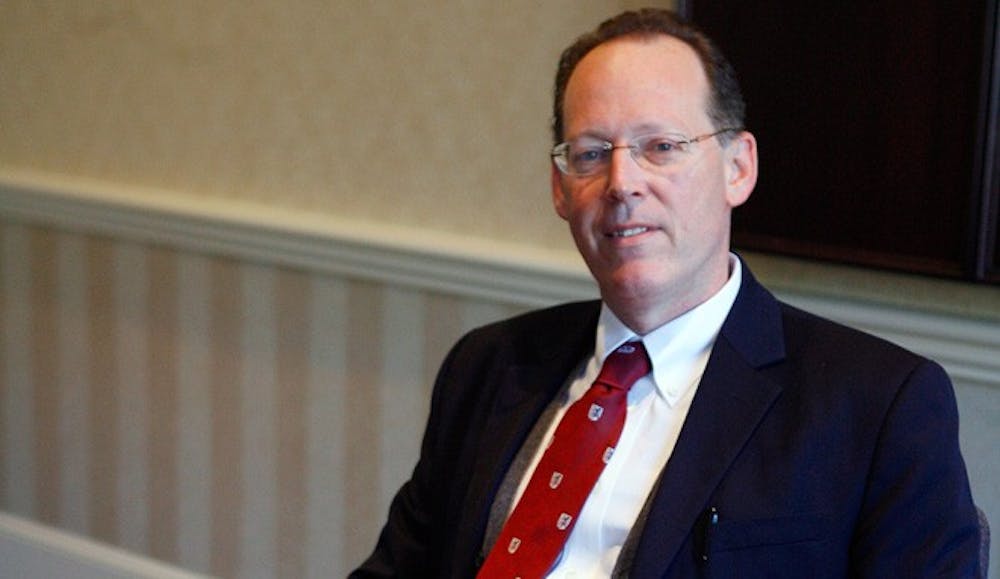The small island nation of Haiti has faced chronic challenges in its 200-year history, which only compounded the impact of the massively destructive earthquake Jan. 12, 2010, and the subsequent cholera outbreak, a leading physician and humanitarian said.
Dr. Paul Farmer, Trinity ’82 and Kolokotrones University Professor and chair of the Department of Global Health and Social Medicine at Harvard Medical School, addressed a packed Reynolds Industries Theater Saturday to discuss the specifics of the Haitian recovery effort, the obstacles facing health care expansion in the developing world and the role of universities in expanding health equity around the globe. Farmer has worked in global health development in Haiti for almost 30 years and helped guide the nation’s recovery effort as United Nations Deputy Special Envoy for Haiti. He is also member of the Board of Trustees, which met this weekend, and the Duke Global Health Institute Board of Advisors.
Farmer also founded Partners in Health, a global health group that provides care to underserved communities in 12 developing countries beginning in Haiti. The goal of providing medical coverage to extremely poor populations requires a willingness to envision a better future, Farmer said.
“One of the biggest problems I’ve seen is a failure of imagination, a failure to imagine an alternative future for people who face two problems at once—serious illness and poverty,” he said.
A squatter settlement in Cange, Haiti, is an example of what can be achieved with imagination. The settlement originated as a relocation camp for residents displaced by the construction of a hydroelectric dam. The refugees were living in squalor, but PIH launched its first clinic in the area in 1985. After many years of continued community-based development, the once barren site is reforested, with its own medical center and schools, Farmer noted.
The earthquake that leveled the capital, Port-au-Prince, took the nation and the development community by surprise. Farmer had vacationed there with his family shortly before the quake.
“If someone had said there would be a major earthquake, that will level the capital city, I would have said it was absurd,” Farmer said. “We did not anticipate the earthquake and that was a mistake because the toll was made greater by the lack of a solid building code and by the lack of preparation.”
The quake killed an estimated 250,000 people, many of whom died in the collapse of buildings that were not built to withstand tremors. The destruction raised the question of how to structure foreign aid funding and improve Haitian infrastructure beyond its status before the earthquake. Recovery efforts were stymied by a lack of housing and safe water. Two years after the quake, only 30 percent of the rubble had been cleared, Farmer said.
In the face of these challenges, the relief efforts from medical universities contributed vital support, he said.
“There is a lot of work to do still, but nothing can change the fact that a lot of lives were saved by the teams that went to Haiti after the earthquake,” Farmer said. “We can be proud of the role of academic medical centers in the response.”
Farmer’s delivery of sobering facts about the critical state of Haiti was punctuated with a bright sense of humor, which drew laughter from the audience several times.
“I had been warned about his sense of humor, but if I hadn’t been warned, I would have been shocked,” said Chapel Hill resident Diane Covington, who came with her daughter as part of a group from Carrboro High School. “He has a very good sense of humor.”
The presentation transitioned into a question and answer session moderated by Deborah Jenson, director of undergraduate studies in romance studies and professor of French and romance studies, and Laurent Dubois, interim director of graduate studies in romance studies, professor of French studies and history and director of the Center for French and Francophone Studies. Organizers fielded questions from the audience via Twitter, email and text message. Provost Peter Lange, whose office co-sponsored the event, noted in an interview that this format streamlines the questioning process and promotes concise questions.
Lange introduced the question and answer session by describing the a collaborative effort among Haiti specialists in the faculty that led to the creation of the Haiti Lab and the Program in Creole.
Farmer fielded questions on topics ranging from the value of Creole language and culture, the vitality of Haitian art and the importance of academic institutions.
“What universities push into our laps is critical feedback loops,” he said. “I cannot tell you how many things I’ve learned as a teacher from my students—innovation comes out of change, change comes out of critical feedback loops and critical feedback loops come out of having trainees.”
Haiti hosts more nongovernmental organizations per capita than any other country, but coordination among them remains a challenge, Farmer said.
“Coordination, so we add up to more than the sum of our parts, requires humility on the part of NGOs. We are, [however,] conditioned for scarcity—it’s crept into the NGOs where it’s all about branding and carving out your turf,” he said. “Haiti needs a firmer hand with us—the NGOs—to say, ‘You go here, and you go here.’”
This effort faced a setback when two government officials assigned to this task were killed in the earthquake, he noted.
Farmer also advocated changing the rules of the road for foreign assistance to prioritize capacity building and job creation in Haiti, which would free up more capital for the recovery effort.
“I don’t think there’s anything more empowering for a Duke student than to see someone who lived in our very same dorm rooms... and then left to become probably the world’s greatest beacon of social justice in the context of health—there’s nothing more empowering,” said junior Sanjay Kishore, president of the Duke Partnership for Service.
Get The Chronicle straight to your inbox
Signup for our weekly newsletter. Cancel at any time.

